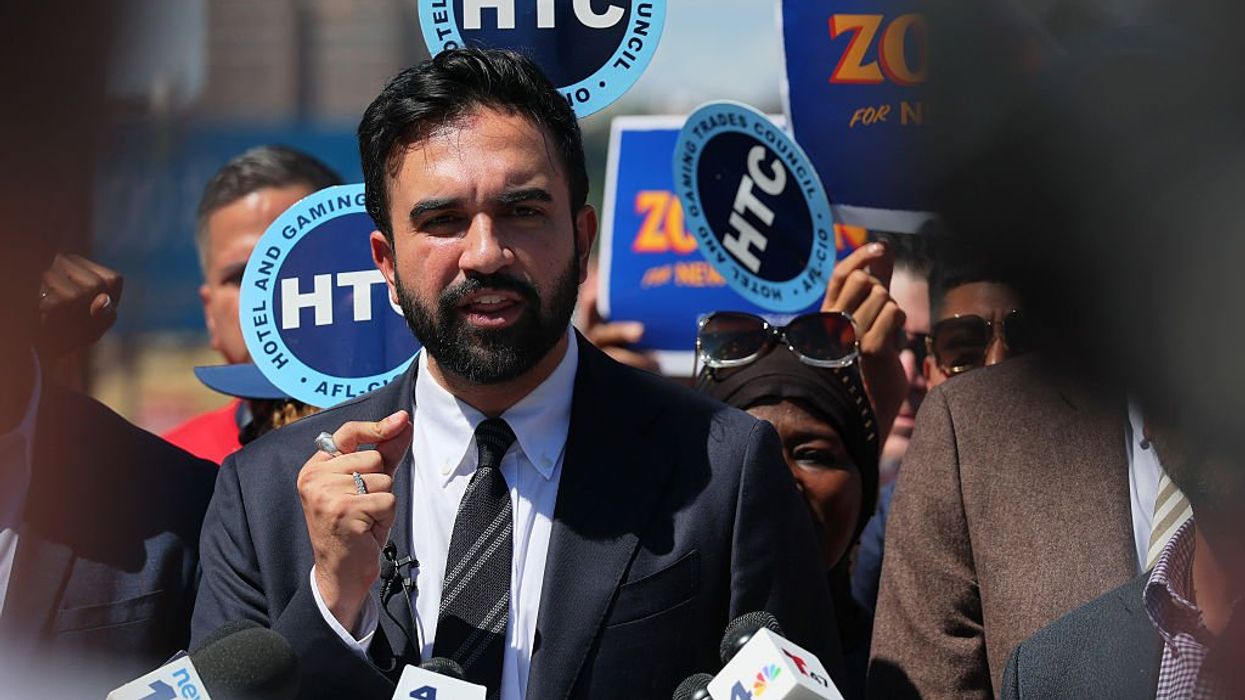Zohran Mamdani’s improbable rise—from barely registering in the polls to winning a primary against all odds—has been called a miracle. A Muslim, unapologetically left, and unafraid to speak plainly about the Gaza genocide, Mamdani triumphed despite doing everything the political establishment insists is disqualifying. Against every expectation, he closed a thirty-point gap and prevailed.
And yet, as the establishment begins to circle around him, many on the left who have supported his anti-establishment insurgency feel the familiar sting of suspicion. We remember how Sanders faltered, how Warren splintered the movement, how Obama cut deals that weakened the base, how AOC voted for financing Israel’s Iron Dome even in the context of an unfolding genocide. Each disappointment reinforces the conviction that betrayal is inevitable. And the truth is that it is inevitable—not because politicians are uniquely weak or uniquely corrupt but because of the way our politics is currently structured.
Every politician in our political system today is an individual actor with agency. That agency means choice, and choice means divergence. No matter how aligned a representative may be with our values, at some point, inevitably, they will cast a vote, strike a compromise, or make a calculation that cuts against what we wanted. We don’t forget those moments. We sear them into memory, and we label them betrayal. That is why bitterness has become the permanent backdrop of our politics. We live in a cycle of disappointment, not because individuals are especially flawed but because the system compels them to decide in our name and inevitably at times against our will.
This reality explains the cynicism that so pervades political life. We assume every handshake is a sellout, every meeting a concession, every alliance a slippery slope. Cynicism becomes the armor we wear to shield ourselves from disappointment. But in wearing it so tightly, we often turn it inward, sabotaging our own efforts before they can bear fruit. History is littered with examples of this pattern.
In 1968, after Lyndon Johnson stepped aside, the anti-war movement had a chance to consolidate around Eugene McCarthy or Robert Kennedy. Instead, activists tore into one another over ideological purity and strategy. By the time Kennedy was assassinated and the Democratic convention imploded in Chicago, the movement had fractured, handing Richard Nixon the presidency and prolonging the Vietnam War. Occupy Wall Street, too, began with clarity—“We are the 99%”—and electrified millions. But because it refused to channel that energy into lasting political structures, it splintered into debates and purity contests, made vulnerable to infiltration but undone mostly by its own refusal to resist suspicion and build resilience. Even the Sanders campaigns carry this lesson. In 2016 and again in 2020, parts of the left turned their fury not just against the party that rigged the process but against each other. That self-directed suspicion made retreat easier and defeat more certain.
The common thread is not simply betrayal by leaders but the inevitability of betrayal in a system built on agency. Every representative, no matter how sincere, will eventually diverge from the people they represent. When they do, we feel betrayed. When the betrayals accumulate, cynicism calcifies. And when cynicism dominates, movements collapse under the weight of their own mistrust.
But what if betrayal were no longer built into the system? What if votes in Congress were not the product of a single arbiter’s judgment but the direct reflection of citizen majorities? In such a system, a representative would not be an agent with discretion but a conduit. No calculation, no triangulation, no deal-making—only the tallying of where the people stand. The majority asserted its will, and that would be the end of the story. In such a system, the notion that one is betrayed by their representative because they cast a vote that was not to their liking would make no sense. The majority’s will was asserted, and that is the end of that. The representative had no say in the matter.
In other words, betrayal—in the sense we know it today—would simply vanish, because there would be nothing to betray. And with it, cynicism would dissolve too. The suspicion that shadows every alliance and every strategic decision would lose its grounding. If power were tethered directly to majorities, the old vocabulary of compromise and betrayal and backstabbing would be emptied of meaning. In such a politics, today’s cynicism would evaporate.
For now, of course, we do not live in such a world. Mamdani, like every politician, must still navigate terrain full of allies and adversaries, where betrayal remains not just possible but mathematically certain. That does not mean we abandon him or retreat into isolation. To refuse to engage with figures like Obama or Warren, or to close doors out of fear of contamination, would not be principled but paralysis. Power is never won by refusing to step onto the field. It is won by entering it with clear eyes, recognizing that betrayal is baked into the structure, and still pushing forward.
The task before us, then, is twofold. First, to tactically resist the temptation to sabotage ourselves with reflexive cynicism—to recognize that suspicion alone cannot be the foundation of a movement. Second, to keep alive the strategic vision of a politics beyond betrayal, where representatives no longer act as free agents but as direct reflections of the people they serve. That vision is not naïve. It is the only way to imagine a politics in which cycles of bitterness and disappointment do not consume us.
Ahmed Bouzid is the co-founder of The True Representation Movement.




















Eric Trump, the newly appointed ALT5 board director of World Liberty Financial, walks outside of the NASDAQ in Times Square as they mark the $1.5- billion partnership between World Liberty Financial and ALT5 Sigma with the ringing of the NASDAQ opening bell, on Aug. 13, 2025, in New York City.
Why does the Trump family always get a pass?
Deputy Attorney General Todd Blanche joined ABC’s “This Week” on Sunday to defend or explain a lot of controversies for the Trump administration: the Epstein files release, the events in Minneapolis, etc. He was also asked about possible conflicts of interest between President Trump’s family business and his job. Specifically, Blanche was asked about a very sketchy deal Trump’s son Eric signed with the UAE’s national security adviser, Sheikh Tahnoon.
Shortly before Trump was inaugurated in early 2025, Tahnoon invested $500 million in the Trump-owned World Liberty, a then newly launched cryptocurrency outfit. A few months later, UAE was granted permission to purchase sensitive American AI chips. According to the Wall Street Journal, which broke the story, “the deal marks something unprecedented in American politics: a foreign government official taking a major ownership stake in an incoming U.S. president’s company.”
“How do you respond to those who say this is a serious conflict of interest?” ABC host George Stephanopoulos asked.
“I love it when these papers talk about something being unprecedented or never happening before,” Blanche replied, “as if the Biden family and the Biden administration didn’t do exactly the same thing, and they were just in office.”
Blanche went on to boast about how the president is utterly transparent regarding his questionable business practices: “I don’t have a comment on it beyond Trump has been completely transparent when his family travels for business reasons. They don’t do so in secret. We don’t learn about it when we find a laptop a few years later. We learn about it when it’s happening.”
Sadly, Stephanopoulos didn’t offer the obvious response, which may have gone something like this: “OK, but the president and countless leading Republicans insisted that President Biden was the head of what they dubbed ‘the Biden Crime family’ and insisted his business dealings were corrupt, and indeed that his corruption merited impeachment. So how is being ‘transparent’ about similar corruption a defense?”
Now, I should be clear that I do think the Biden family’s business dealings were corrupt, whether or not laws were broken. Others disagree. I also think Trump’s business dealings appear to be worse in many ways than even what Biden was alleged to have done. But none of that is relevant. The standard set by Trump and Republicans is the relevant political standard, and by the deputy attorney general’s own account, the Trump administration is doing “exactly the same thing,” just more openly.
Since when is being more transparent about wrongdoing a defense? Try telling a cop or judge, “Yes, I robbed that bank. I’ve been completely transparent about that. So, what’s the big deal?”
This is just a small example of the broader dysfunction in the way we talk about politics.
Americans have a special hatred for hypocrisy. I think it goes back to the founding era. As Alexis de Tocqueville observed in “Democracy In America,” the old world had a different way of dealing with the moral shortcomings of leaders. Rank had its privileges. Nobles, never mind kings, were entitled to behave in ways that were forbidden to the little people.
In America, titles of nobility were banned in the Constitution and in our democratic culture. In a society built on notions of equality (the obvious exceptions of Black people, women, Native Americans notwithstanding) no one has access to special carve-outs or exemptions as to what is right and wrong. Claiming them, particularly in secret, feels like a betrayal against the whole idea of equality.
The problem in the modern era is that elites — of all ideological stripes — have violated that bargain. The result isn’t that we’ve abandoned any notion of right and wrong. Instead, by elevating hypocrisy to the greatest of sins, we end up weaponizing the principles, using them as a cudgel against the other side but not against our own.
Pick an issue: violent rhetoric by politicians, sexual misconduct, corruption and so on. With every revelation, almost immediately the debate becomes a riot of whataboutism. Team A says that Team B has no right to criticize because they did the same thing. Team B points out that Team A has switched positions. Everyone has a point. And everyone is missing the point.
Sure, hypocrisy is a moral failing, and partisan inconsistency is an intellectual one. But neither changes the objective facts. This is something you’re supposed to learn as a child: It doesn’t matter what everyone else is doing or saying, wrong is wrong. It’s also something lawyers like Mr. Blanche are supposed to know. Telling a judge that the hypocrisy of the prosecutor — or your client’s transparency — means your client did nothing wrong would earn you nothing but a laugh.
Jonah Goldberg is editor-in-chief of The Dispatch and the host of The Remnant podcast. His Twitter handle is @JonahDispatch.